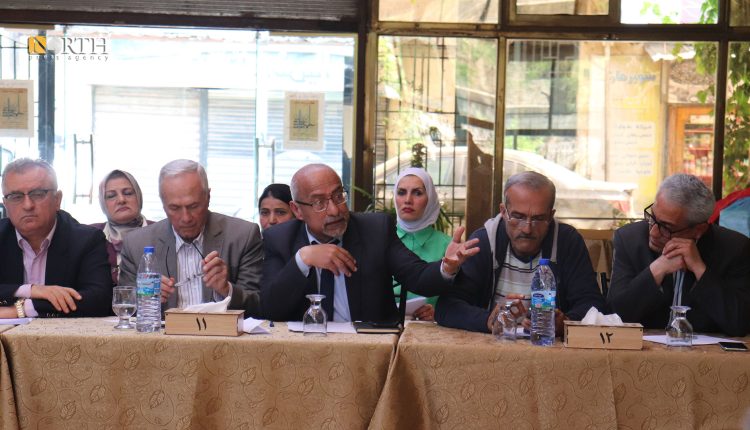Aleppo Workshop Highlights Transitional Justice as Key to Syria’s Social Reconciliation
By Kardo Roj
ALEPPO, Syria (North Press) – A workshop held on Saturday in Aleppo brought together political figures, civil society members, and legal experts to explore the role of transitional justice in fostering social harmony in post-conflict Syria. Organized by the Syrian Democratic Council (SDC), the forum marked the second such event in the city aimed at promoting dialogue around justice, accountability, and reconciliation.
The workshop, attended by approximately 40 participants, focused on the legal frameworks and practical steps necessary to implement transitional justice in Syria, particularly in the context of the ongoing political transformation following the collapse of the Ba’athist regime.
Fatima al-Husseino, head of the SDC’s Office of Relations in Aleppo, described the event as “qualitative and timely,” noting its importance in addressing public concerns around justice and rebuilding communal trust. “This initiative is not only about discussing concepts,” she told North Press, “but also about drawing up actionable recommendations that can be taken to decision-makers or implemented through community committees.”
The event featured four breakout discussions covering legal mechanisms, truth commissions, victim rights, and community-based reconciliation strategies. The SDC, which plays a central role in the governance of northeast Syria under the Autonomous Administration, has increasingly emphasized transitional justice as a cornerstone of its post-conflict vision for Syria.
Hala al-Yaseen, a legal researcher and participant in the workshop, emphasized the complexity of applying transitional justice in Syria. “It requires committed actors who understand the depth of the suffering experienced by all Syrians,” she said. “We must ensure that accountability is applied fairly, not selectively, and that all perpetrators of violence—regardless of affiliation—are held responsible.”
Her remarks reflect a growing consensus among civil society groups that a sustainable peace in Syria cannot be achieved without confronting past abuses and restoring trust between fragmented communities. However, experts note that transitional justice must be tailored to Syria’s unique political and societal fabric, requiring cooperation across regions and factions.
The SDC’s push for transitional justice aligns with broader efforts by the Autonomous Administration of North and East Syria (AANES) to lay the groundwork for democratic governance, community reconciliation, and human rights. In regions under AANES control, including Aleppo’s northern countryside, the SDF and civil councils have supported initiatives aimed at restoring social cohesion in the wake of years of war, displacement, and extremist violence.
While the security situation in northeast Syria remains relatively stable compared to other parts of the country, challenges persist, particularly in areas adjacent to Turkish-backed factions and territories influenced by Hayat Tahrir al-Sham (HTS). These regions have seen periodic escalations, complicating efforts at broad national reconciliation.
Participants concluded the Aleppo workshop by drafting a set of recommendations, including the formation of a transitional justice committee, promotion of inclusive legal reform, and increased support for victims of wartime atrocities. Organizers plan to submit these proposals to relevant administrative and legal bodies within the Autonomous Administration and engage with international human rights institutions.
As Syria enters a new phase of uncertain transition, the role of transitional justice will likely remain a focal point in national dialogue efforts. In the coming months, the SDC is expected to expand these workshops to other cities, aiming to build consensus around justice and reconciliation frameworks that can contribute to long-term peace.

